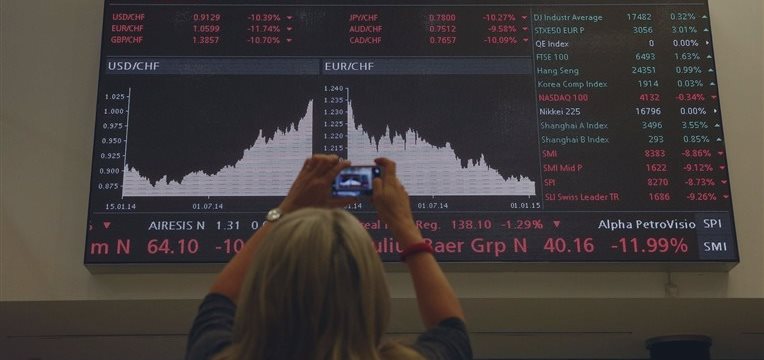
Questions and Answers about Swiss Franc: What actually happened on Thursday, and What was it exactly that the SNB announced
A: The SNB (Swiss National Bank) made an announcement that caused the CHF (Swiss Franc) to suddenly soar in value. The extent and speed of the price rise had never happened before to a major global currency, although there were similar incidents involving the CHF in 2011 and the GBP (British Pound) in 1992. The size and speed of the change meant that most banks effectively stopped buying or selling the CHF for several minutes, which had all kinds of bad effects (more on that later).
Q. What was it exactly that the SNB announced?
A. The SNB announced that they were no longer going to support a cap of
the value in the CHF against the Euro. For more than 3 years, they
would intervene to make sure the CHF was worth no more than 1.2 Euros.
It is relatively easy for a central bank to keep their own currency
weak, but it was getting harder for them to do it, as the price kept
testing 1.20 and the Euro has been weakening dramatically over several
months. The SNB announcement took the market by surprise, as although
there was a logical risk this could happen, as recently as a few days
ago the SNB publicly declared that they had no intention of abandoning
the policy, which now can be seen to be a clear lie. By the way, the SNB
also announced a negative interest rate of 0.75%, meaning depositors
have to pay for the privilege of holding deposits in CHF. This would
usually tend to weaken a currency, at least in the short term.
Q: Why did the SNB Abandon the Cap?
A: There are different interpretations of the SNB’s action so all
explanations are controversial. They said that they no longer feel the
CHF is as overvalued as it was, so maybe they did not feel that they had
to hold the market back so much. However they have also said that they
did not expect the CHF to rise by 15% right away. A deeper explanation
would be that with the recent strong fall in the value of the Euro,
which is by far the currency most strongly linked by trade to the CHF,
it was becoming increasingly difficult and expensive for the SNB to keep
the CHF as weak as the Euro, so they acted to abandon a position that
was becoming untenable. Many have speculated that the SNB were expecting
the ECB (European Central Bank) to announce a program of Quantitative
Easing (QE) later this week, which might well push the value of the Euro
down even further, and at a rapid rate. If the cap had still been in
effect, they would probably have had to have spent a lot of their
reserves buying Euros with CHF.
Q: What will it mean for the price of the CHF going forward?
A: It is hard to say. Usually when the value of a currency moves
strongly up or down quite quickly by this kind of amount, it continues
to move in the same direction for a few more weeks or months at least.
However, there is some feeling that the move has gone far enough, and
that the SNB might act to cap the CHF again at the latest market price,
so it may not continue to increase. In any case, it is quite likely that
in the short-term, the CHF will swing up and down with high volatility.
Q: What will it mean for the prices of other currencies?
A: The move on Thursday seemed to cause some volatility in other
currencies, but that has gone at the time of writing, with nothing but
the CHF moving by very much. It could be argued that now that cash can
flow into the CHF, it might weaken the rise of the USD a little.
Q: Why did Forex traders and brokers lose so much money?
A: Usually, currencies fluctuate in value by very small amounts, far
less than stocks, for example. The Forex market is also usually
extremely liquid. This means that traders can place tight stop losses
and trade with high margin, in the knowledge that if their stop loss is
hit, they will usually not have to pay any slippage. Unfortunately in
this kind of case, the price blew right past almost every stop loss
without stopping, so traders and brokers could not execute any trade
exits until the price of all CHF pairs had moved by far more than 1,000
pips. This meant that instead of exiting at stop losses such as 50 pips
of loss, emergency exits had to be made at more than 1,000 pips or more.
With leverage, most traders in any kind of short CHF trade would have
had their entire deposits wiped out. In fact, many traders suffered
losses beyond that, and are now facing negative account balances, which
brokers may or may not be able or willing to chase. As for brokers
losing money, there are two reasons for this: some brokers hedge their
clients’ trades in the real market, where they also experienced the same
problems even more strongly than their own clients did, meaning they
could not pass on their clients’ losses. The second reason is that
anyone who was in a long CHF trade with a broker, would have made a lot
of money, and the balance of these trades may not have been covered by
the losses of the losers, as the losers would have mostly negative
account balances.
Q: So I can end up owing my broker more than I deposited with them?
A: Yes, although it is very rare for this situation to happen. Some
brokers do state that they will never pursue a client for a negative
balance, as they consider it to be a fault of their own risk management
procedures if it happens (e.g. FXCM). Other brokers, such as Oanda, have
announced that they will forgive any negative balance. However there
are unconfirmed reports of certain brokers writing to clients demanding
they make good large negative balances. Some brokers, for example
Saxobank, have actually stated that they may “re-quote” client’s closed
CHF trades to the detriment of the clients’ positions.
Q: What about my broker? Will brokers go out of business?
A: You should get in touch with your broker if you are concerned about
the situation. It is too early to say if any brokers will go out of
business, but without doubt, many brokers have suffered heavy losses.


